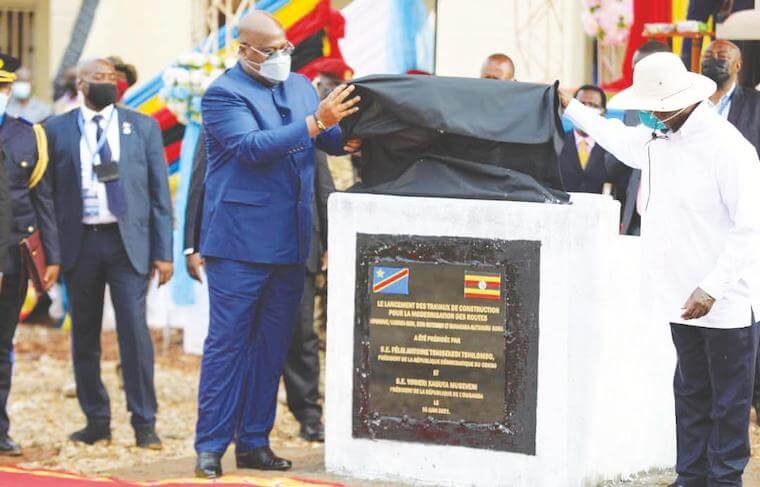
Our Projects are
Transforming African Trade
Quick Contacts
2nd Floor, Fidelity Insurance Centre Waiyaki Way, Westlands

As Uganda and the Democratic Republic of the Congo (DRC) continue to operate joint ventures in the military and infrastructure, this year’s DRC-Uganda Business Forum is expected to find ways of how to deepen bilateral trade and partnerships between the two countries.
The forum, which is organized and coordinated by the DRC-Uganda Business Association (DUBA), through Uganda’s embassy in Kinshasa and the DRC embassy in Kampala, will run for four days from March 22 to 25, 2022 in Kampala under the theme “Deepening Bilateral Trade, Partnerships, Knowledge Transfer for Mutual Peace and Prosperity.”
In a press statement released by DUBA, the forum is going to be a high-level engagement, graced by both Uganda and the DRC ambassadors, ministers, as well as prominent public and private sector players and entities.
DR Congo is an important business partner for Uganda. It is estimated that nearly all the gold that Uganda exports – which makes the mineral the country’s largest export earner for Uganda – is from the DR Congo.
The presence of gold refineries such as that by African Gold Refinery in Entebbe, has boosted the export of gold by Uganda, and brought the country the much- needed foreign exchange reserves.
“Uganda and the DRC enjoy fraternal and excellent bilateral relations which are evidenced by established cooperation frameworks including the Joint Permanent Commission, joint security operations and many other bilateral understandings which have enabled the two sisterly states to achieve common goals and objectives,” reads the statement.
The forum seeks to enhance opportunities and partnerships for sustainable and inclusive development since the two countries have continued to work out mechanisms for mutual development, including the joint infrastructure projects, joint patrols and one-stop border posts. The bilateral infrastructure development agreements, alongside joint security operations, shall secure the volatile areas so that the DRC’s sustainable economic development may be realized.
“It is on that, that we look to further the existing structures of formal bilateral trade, markets, partnerships, knowledge transfer for mutual peace and prosperity between the governments and people of DRC and Uganda as we stimulate bilateral, regional intra-Africa trade and social economic development,” the statement adds.
OPPORTUNITIES
According to DUBA, the forum will offer numerous opportunities to the business communities in both countries, which among others, will include meeting the decision- makers of both countries like the presidents, ministers, departments and agencies (MDAs), high-level officials and company CEOs.
It will also offer envisioned opportunities for investment and partnerships in agriculture, trade, energy, ICT, construction, natural resources as well as knowledge transfer in areas of manufacturing and industries, agro processing and bilateral /cross-border industrial parks.
The forum will also offer networking and linkages through government to business (G2B) and business to business (B2B).
Kenneth Muhangi, the managing partner at KTA Advocates, one of the collaborative organizers of the forum, said while aspects of trade and markets to the DRC are what many aspire to bilaterally undertake, the optimisms bilateral capacitation and knowledge transfer is another aspect that Uganda is going to harness in the existing relations.
“Uganda and her people are keen to further bilateral relations with DRC and her people. With a combined population of 134 million people, we are excited to be part of such a huge event that will attract tangible investment and knowledge transfer in areas like intellectual property and ICT,” Muhangi said.
He further noted: “Uganda is on the path to middle-income status and with the opportunities this forum presents, we look forward to participations from market leaders in telecom, retail, digital trade, hospitality, and manufacturing among the many areas of interest.”
Read original article
Disclaimer: The views and opinions expressed in this article are those of the authors and do not necessarily reflect the official policy or position of TradeMark Africa.